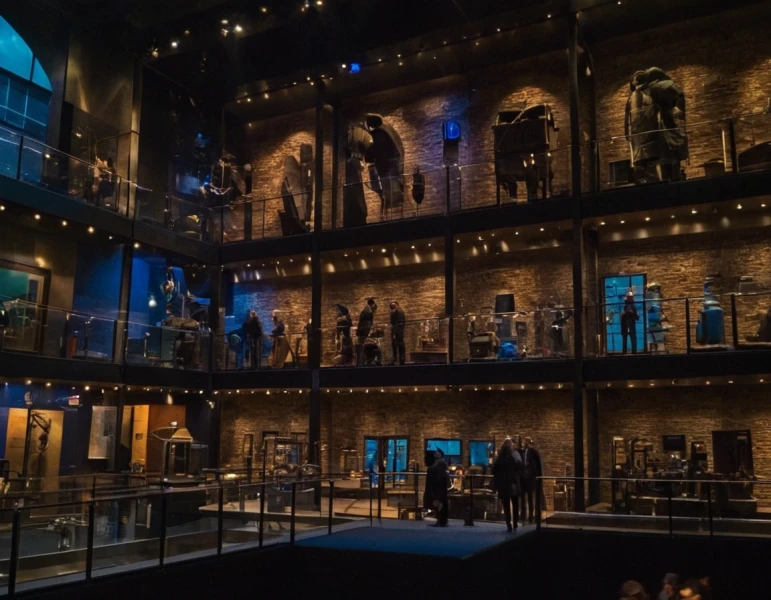Educa UNIVERSITY|SCIENCE AND ENGINEERING
London Science Museum: A Curious Person's Paradise
Related Masters
London Science Museum: A Curious Person's Paradise
Hello, friend of science and knowledge! I'm Ruben Aguila, and today I'm here to tell you why the Science Museum in London ("Science Museum" to the locals) is much more than a building full of dusty display cases and boring posters. This place is a sanctuary for the curious, a space where science and technology merge to dazzle you.
Throughout my life, I've had the privilege of visiting this museum on several occasions. From my first foray as a student to my recent visits as a travel lover, it has always managed to ignite a spark of wonder in me. And I want to share with you, in a light-hearted but authoritative tone, what makes this museum so special.
A Brief Introduction to London's Science Museum

Founded in 1857, London's Science Museum was initially part of the South Kensington Museum, along with the now-famous Victoria and Albert Museum. In 1928 it became independent and moved to its current location on Exhibition Road, South Kensington. With more than 300,000 objects in its collection, this museum not only limits itself to exhibiting historical pieces, but also invites its visitors to interact and learn.
And you know what the best part is? Admission is free! Although, of course, you can always make a donation or buy something from their store to help with upkeep.
What You Can See at the Museum
The Science Museum London is not just a simple tour; it's a seven-story experience filled with wonders. If I had to sum up the most impressive, I'd say:
Floor 0: Energy and Industrial Revolution
As soon as you enter, you stumble upon the Energy Hall, an exhibit that transports you back to the Industrial Revolution. Highlights here include:
The Boulton and Watt steam engine.
Newcomen's first steam engine (1712).
An immense mechanical wheel used in power plants until 1970.
On this floor you can also explore "Making the Modern World", one of my favorite sections.
Why? Because it shows how technology transformed the world, from early clocks to the iconic Apollo 10 command module.
Floor 1: Medicine and Humanity
Go up one level and you'll find a fascinating exhibit on the history of medicine. From a 19th-century pharmacy to the first X-ray machines, this space illustrates how medical science has saved millions of lives.
In addition, the Who Am I?exhibit leads us to reflect on what makes us human and how technology is changing our bodies and minds. This part always leaves visitors with deep questions.
Floor 2: Weather and Climate
Here you can see antique clocks and learn about the atmosphere and climate in an interactive gallery that fascinates young and old alike. Perfect for understanding climate change without getting bored!
Floor 3: Aviation and Energy
If you're a fan of airplanes, you'll love this floor. You'll be able to see reproductions of the first models to take to the skies, like the one that crossed the English Channel.
And don't miss the interactive section on energy, where you can learn about different energy sources and their impact on the planet.
What Makes This Museum So Special
I'll be clear: this is not a museum to look at passively. Here you touch, explore and play. With interactive exhibits and an educational approach, the Science Museum achieves what few museums can: arouse curiosity and make you learn almost without realizing it.
For example:
IMAX Cinema: If you're a film lover, here you can enjoy impressive documentaries on a giant screen.
Virtual Reality Simulators: Yes, you can fly or travel into space without taking your feet off the ground.
Experiment Zone: Designed for children (and adults with the soul of a child), where you can perform real science experiments.
Practical Tips for Visiting the Museum
Plan your visit: Open from 10:00 am to 6:00 pm (last admission is at 5:15 pm).
Get there early: The most popular exhibits tend to fill up fast.
How to get there: Use the Tube (South Kensington station) or local buses. You can also combine your visit with a stroll through Hyde Park or a visit to Harrods.
Save time: Spend at least 2-3 hours to explore thoroughly.
Budget: Although admission is free, some attractions such as the IMAX have a cost.
My Personal Reflection
Over the years, this museum has taught me an invaluable lesson: science is not just for geniuses in laboratories. It's for all of us.It's the backdrop to our lives, from the cell phone in your pocket to the car you drive.
If you're ever lucky enough to visit London, take my advice: Go to the Science Museum. It doesn't matter if you're an adult, a child or a grandparent. This place has something for you.
.
Faculties
Trainings
The faculties embrace diverse academic disciplines and fields of study, opening doors to new perspectives and exploring different spheres of wisdom in a constantly evolving world.














